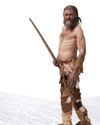
When Charlotte Woodward was born, she had a genetic condition called Down syndrome. Doctors told her parents that she'd most likely never learn to read or write. All she could expect as an adult, they said, was a job in a sheltered workshop making less than minimum wage.
"My mom knew that wasn't right, so she didn't take those words to heart," Woodward, now 33, says.
"She instilled in me a love of education, and I started learning to read when I was three and a half years old."
Woodward has a degree in sociology from George Mason University in Virginia. Her studies concentrated in inequality and social change. In the past decade, she's written several articles that have appeared in medical journals and has contributed to a chapter of a book. One TikTok she made about discrimination that people with Down syndrome face has received more than three million views.
What Is Down Syndrome?
In the United States, one in every 700 babies is born with Down syndrome. It's a genetic condition caused by an extra copy of an individual's 21st chromosome. Kids with Down syndrome may be short in stature and have low muscle tone, which can affect their speech. They also possess intellectual disabilities to varying degrees. This means that it may be particularly challenging for them to learn new information and skills.
"One of the most notable differences in brain anatomy between children with Down syndrome and neurotypical children is that the former tend to have smaller brains," says Ben Spielberg. He's a neuroscientist in Los Angeles, California, and has studied the brains of kids with the condition. "Individuals with Down syndrome typically have a smaller hippocampus, which is responsible for memory and learning, as well as an impacted cerebellum, [which is] responsible for motor coordination."
How Does Down Syndrome Affect Learning?
This story is from the {{IssueName}} edition of {{MagazineName}}.
Start your 7-day Magzter GOLD free trial to access thousands of curated premium stories, and 9,000+ magazines and newspapers.
Already a subscriber ? Sign In
This story is from the {{IssueName}} edition of {{MagazineName}}.
Start your 7-day Magzter GOLD free trial to access thousands of curated premium stories, and 9,000+ magazines and newspapers.
Already a subscriber? Sign In

A 12-Year-Old Girl's Election Sticker Is a Winner
VOTING IS A FUNDAMENTAL FREEDOM FOR AMERICANS, A MEANS OF DOING ONE'S CIVIC DUTY AND A WAY AN INDIVIDUAL CAN EXPRESS THEIR VOICE. In 1971, the United States lowered its voting age to 18. But that doesn't mean kids and teens under 18 can't participate in elections in various ways.

If everything the human brain does is basically sets of electrical impulses, how exactly does that translate into a state of mind?
You're not the only one asking this question. Every neuroscientist in the world is wondering the exact same thing, says Zach Mainen

EARTH'S TINIEST BUILDERS
THE HIDDEN WORLD OF MICROBES IN THE EARTH'S CRUST

MUMMIES SPEAK
ABOUT MICROBES, MIGRATION, AND MORE

GOING WITH YOUR GUT
HOW DO MICROBES AFFECT OUR HEALTH? LET'S COUNT THE WAYS...

BUG Detective
A burglar sneaks into a house on a quiet street in New York City. He walks through the house, touching countertops and door handles. Finally, he steals a single card from a full deck. Then he leaves.

Little Creatures Among Us THE MANY MICROBES IN OUR DAILY LIVES
When you think you're alone, you're actually not. In the ground, the air, your room, and even your body are Strillions and trillions of creatures so tiny you can't see them.

A Mars Rock Found With Leopard Spots Could Be a Sign of Ancient Life
IN JULY, NASA'S PERSEVERANCE ROVER CAME ACROSS A SPOTTED ROCK IN WHAT WAS ONCE A RIVERBED IN THE JEZERO CRATER ON MARS.

Para Athlete Uses Exoskeleton Suit to Carry the Olympic Torch
In July, a 36-year-old French tennis para athlete, Kevin Piette, got a chance to participate in this summer’s Olympic torch relay without using a wheelchair.

Ancient Egyptians May Have Used a Water System to Lift Stones to Build Pyramid
HOW ANCIENT EGYPTIANS BUILT THE MASSIVE PYRAMIDS IN EGYPT MORE THAN 4,000 YEARS AGO HAS LONG BEEN A TOPIC OF WONDER AND DEBATE.